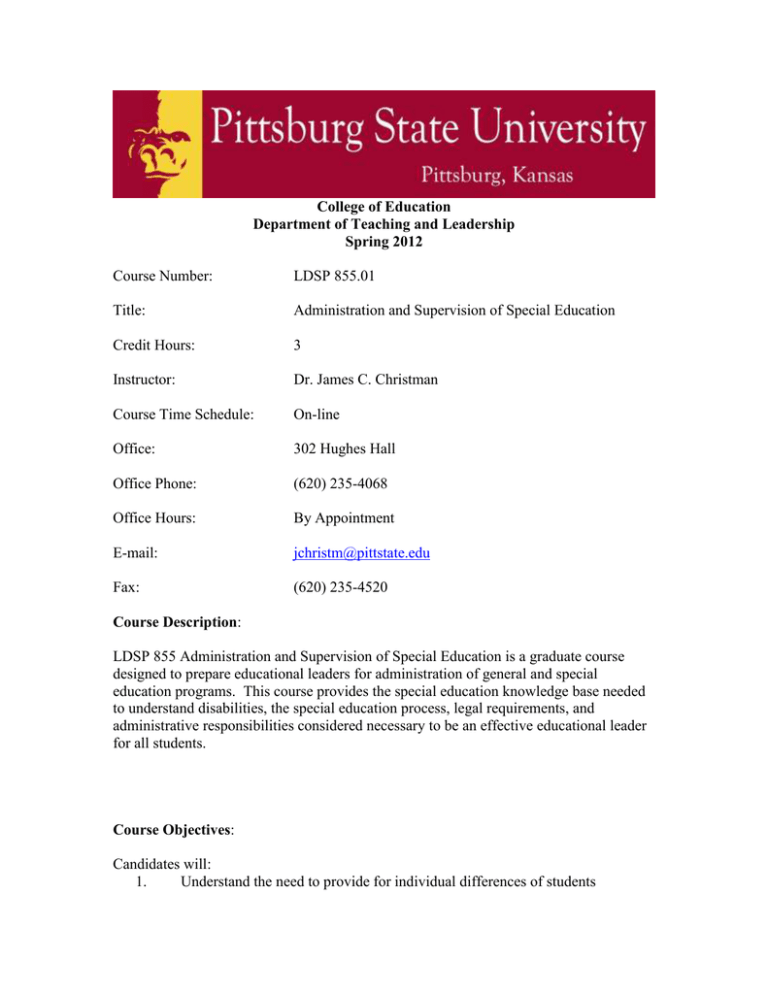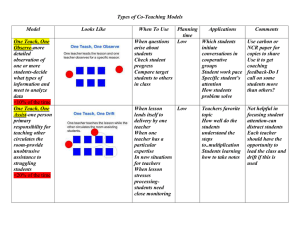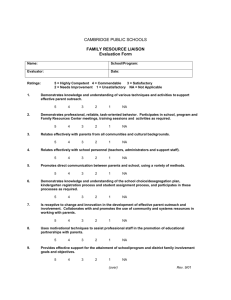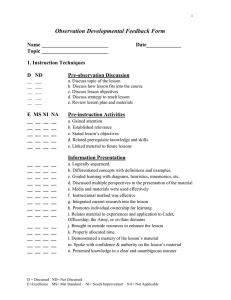LDSP 855
advertisement

College of Education Department of Teaching and Leadership Spring 2012 Course Number: LDSP 855.01 Title: Administration and Supervision of Special Education Credit Hours: 3 Instructor: Dr. James C. Christman Course Time Schedule: On-line Office: 302 Hughes Hall Office Phone: (620) 235-4068 Office Hours: By Appointment E-mail: jchristm@pittstate.edu Fax: (620) 235-4520 Course Description: LDSP 855 Administration and Supervision of Special Education is a graduate course designed to prepare educational leaders for administration of general and special education programs. This course provides the special education knowledge base needed to understand disabilities, the special education process, legal requirements, and administrative responsibilities considered necessary to be an effective educational leader for all students. Course Objectives: Candidates will: 1. Understand the need to provide for individual differences of students 2. 3. 4. 5. 6. 7. 8. 9. 10. 11. Understand the need to provide for the special needs of all exceptional children and youth Understand the issues of a complex and culturally diverse society Understand the scope of special education programs Understand the framework for developing and operating special education programs Understand the administrative role in special education programs and services Understand procedures utilized in screening, assessing, and placing students in special education programs Understand programming needs of all exceptional children and youth Understand the evaluation process for special education students and personnel Describe a variety of instructional methods that can be used with exceptional pupils Understand a written local comprehensive plan for the provision of special education and related services Interstate School Licensure Consortium (ISLLC) Standards for School Leaders This course is aligned with the ISLLC Standards; candidates are specifically assessed to determine their level of proficiency for Standard Six. ISLLC Standards for School Leaders Standard One An education leader promotes the success of every student by facilitating the development, articulation, implementation, and stewardship of a vision of learning that is shared and supported by all stakeholders. Standard Two An education leader promotes the success of every student by advocating, nurturing, and sustaining a school culture and instructional program conducive to student learning and staff professional growth. Standard Three An education leader promotes the success of every student by ensuring management of the organization, operation, and resources for a safe, efficient, and effective learning environment. Standard Four An education leader promotes the success of every student by collaborating with faculty and community members, responding to diverse community interests and needs, and mobilizing community resources. Standard Five An education leader promotes the success of every student by acting with integrity, fairness, and in an ethical manner. Standard Six An education leader promotes the success of every student by understanding, responding to, and influencing the political, social, economic, legal, and cultural context. Pittsburg State University Graduate Knowledge Base The Graduate Knowledge Base is used to assess the knowledge and skills of PSU graduate candidates; items identified in bold type are either introduced or assessed in this course. Graduate Knowledge Base 1. 2. 3. 4. 5. 6. 7. 8. 9. 10. 11. 12. 13. 14. 15. 16. 17. 18. 19. 20. 21. 22. 23. 24. 25. 26. 27. 28. 29. Acts with integrity and fairness in an ethical manner. A Demonstrates commitment to life-long learning. Participates in ongoing professional development. Demonstrates professional behavior. Sets priorities through self-motivation and self-direction. Maintains confidentiality at all levels. A Utilizes multiple collaborative strategies necessary in developing effective learning opportunities for all. I Demonstrates a high level of proficiency in oral and written communication skills. Adapts to a variety of unique cultural and ethnic communication styles. Practices effective interpersonal skills that enhance communication. Demonstrates the ability to make decisions based upon data and input from stakeholders. Adheres to ethical and professional standards. A Transforms ideas into action through effective team building. Utilizes a variety of problem-solving strategies and possesses strong critical thinking abilities. Prioritizes tasks and manages time efficiently. Possesses pedagogical knowledge relevant to specific disciplines. I Provides for instructional variation and integration with other disciplines. I Establishes goals and expectations that lead to effective learning. Inspires all learners to develop self confidence and competence. Demonstrates specialized preparation in specific area of study. A Differentiates instruction appropriately for specific needs of learners. A Expects all students will achieve full potential and attain individual success. A Evaluates student knowledge and performance by using multiple methods of assessment. A Utilizes assessment outcomes to develop instruction that meets the needs of all students. A Adheres to ethical and unbiased assessment practices. Demonstrates sensitivity to community and cultural norms. Values students and encourages them to value self and others. I Promotes a bias free learning environment. A Believes in and encourages the success of all learners. A 30. 31. 32. 33. 34. 35. 36. 37. 38. Appreciates individual variation and shows respect for the diverse talents of all learners. A Responds appropriately to larger political, social, economic and cultural issues through global awareness. Maximizes learning by using technology. Enhances the educational environment through technology. Implements various instructional technology strategies. Tailors appropriate technology strategies to a specific content area. Uses existing educational research to inform and guide practice. Maintains ethical standards in both conducting and applying educational research. Identifies and solves problems by making decisions based upon accepted theory and research. Instructional Resources: Required text for LDSP 855 Administration and Supervision of Special Education: Bateman, David and Bateman, C., Fred. (2006) A Principal’s Guide to Special Education Arlington, VA: Council of Exceptional Children. ISBN 0-86586 Kansas Special Education Process Handbook: http://www.ksde.org/ Resources provided by the instructor. Teaching Strategies: Online assignments, resources, and drop boxes. Grading: Assignments are to be submitted through ANGEL; feedback and grades are also posted using the ANGEL system. Students may have an opportunity to re-work and re-submit an assignment one time without grade penalty, however there must be an established time-line for completion. This is to give the student an opportunity to demonstrate mastery at a level acceptable for course completion. Maximum points to be earned on an assignment will be reduced for each calendar day the assignment is late. It is the student’s obligation to make certain the assignment is submitted through ANGEL on the due date. Written Communication Skills: All text submitted should represent the writer’s best writing skills. Spelling, punctuation, grammar, and sentence structure will be evaluated in each assignment and graded accordingly. Respect for the Academic Process: The rights and responsibilities that accompany academic freedom are at the heart of the intellectual purposes of the university. Our conduct as community members should protect and promote the university’s pursuit of its academic mission. We are all, therefore, expected to conduct ourselves with integrity in our learning, teaching and research, and in ways in which we support those endeavors. Please refer to the catalog for the university policy on academic dishonesty. You are expected to do and submit your work and not that of others. Academic Honesty: Students are reminded to be familiar with the “Dishonesty in Academic Work” policy in the University Catalog. Students are expected to demonstrate academic integrity at all times. Violations will be handled as indicated in the written policy. http://www.pittstate.edu/audiences/current-students/policies/rights-and-responsibilities/ academic-misconduct.dot Course Content: LDSP 855 will focus on the following topics: Special education law Role of the principal Process of identification, evaluation, and placement Specific disabilities Issues related to Least Restrictive Environment Principle Services, accommodations and modifications Course Requirements: The student is to be prepared by reading the assigned chapters in the text and supplemental materials. Assignments are to be completed by the due date. Assignments are to be completed and submitted through the Angel system. Assignments and Evaluation: Final grade for LDSP 855 will be based on the following: Assignment Due Date ParticipationOn-going ISSLC Reflection Paper February 2 Confidentiality Project February 23 Interview Report March 16 Collaboration Project Presentation April 13 Disability Presentation As assigned Final Exam May 11 Total Points Points Expected 100 points 50 points 50 points 100 points 100 points 100 points 500 points Grade A B C Points 450-500 400-449 350-399 Percentage of Points 90-100 80-89 70-79





